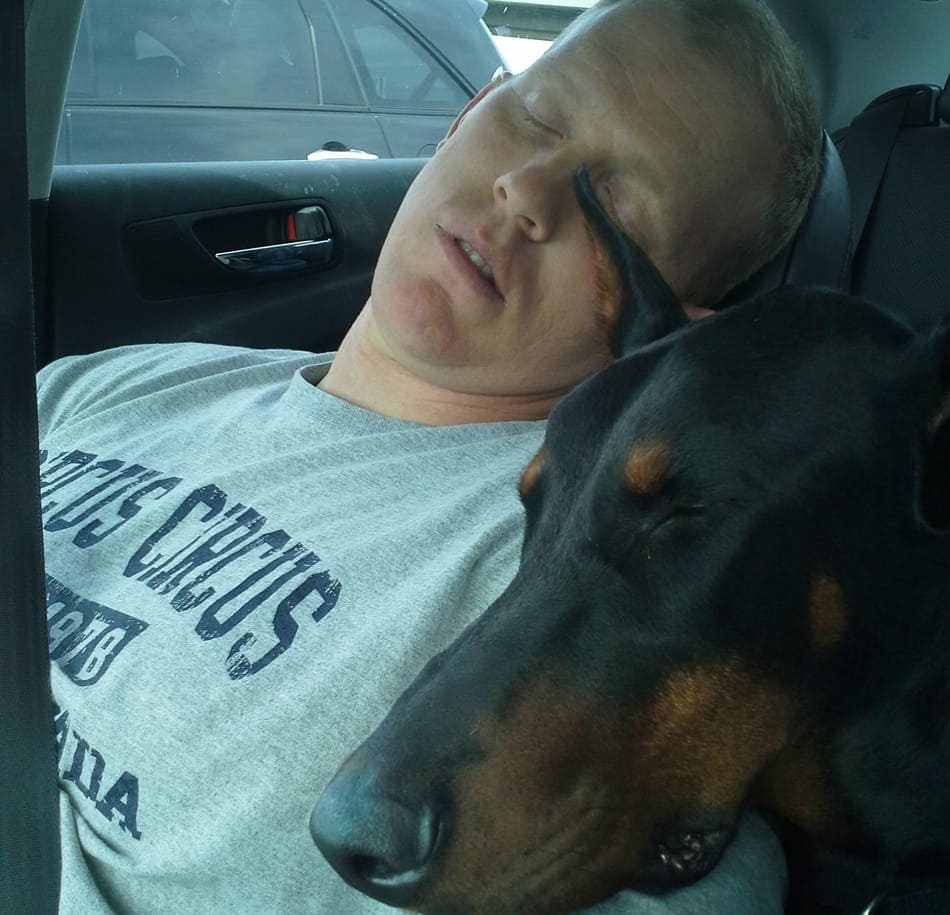
I’ve had many people tell me they would love to own a Doberman Pinscher but are hesitant to because they suffer from allergies. That got me wondering if Doberman’s are hypoallergenic. After all, they have very short hair. Does that mean they won’t cause allergic reactions in most people? Is being allergic to “most dogs” really a valid reason not to own this wonderful breed? I spent quite some time researching this topic and talking to other Doberman owners. Here’s what I found out.
Are Doberman Pinschers Hypoallergenic? Although no dog is 100 percent hypoallergenic, the Doberman Pinscher is generally considered to be a poor choice for those who suffer from allergies. Owners mostly report skin irritations due to the breed’s short, thick fur. Reports of sinus and eye-related irritation from Dobermans are rare.
Luckily, there are things you can do to prevent many of the allergic reactions people have to their Doberman Pinschers. There are also ways that you can help ensure you pick one specific Doberman that you’ll be able to live with.
If you’re new to this breed, see my article The Doberman Pinscher: A Complete Breed Overview for more information about what it’s like living with a Doberman.
How Dobermans Can Cause Allergies
Besides those considering getting a new pet, I have found that many current Doberman owners come to my site because they are suffering from allergies when around the dog they already own and don’t know what to do.
First, it’s important to understand exactly how the Doberman Pinscher breed can cause allergic reactions in people. It’s not always just the pet’s dander floating through the air either.
When considering how hypoallergenic a dog is it’s important to take into account the following aspects:
- Dander levels
- Shedding
- Saliva (or drooling)
- The size of the dog
Doberman’s generally have lower amounts of dander, however, the genetics of the individual dog can make a big difference in the dander levels. Shedding is usually moderate with the Doberman since they have short hair and a thin coat. They are also generally clean dogs and not known for excess saliva. They are considered a large dog breed however and the larger the dog, the more potential hair they can shed.
However, Doberman’s are fairly unique. They don’t usually cause an allergic reaction with their owners because large tuffs of their hair are floating through the air. So why do Doberman’s cause allergic reactions?
Here are common reasons people experience allergic reactions to Dobermans:
- Their fur causes skin irritations. Most Doberman’s have short, thick fur that can potentially pierce the top layers of soft skin. Anytime something pokes the top layer of your skin you risk hives and other irritation. This is often reported on the feet of Doberman owners when walking around their house barefoot, or on their arms when playing with or hugging their dog. I personally have never had this issue, however.
- Something is brought inside the home on their coat. Doberman’s are playful pups who love to run and play outside. This means they can very easily roll in the fresh-cut grass, poison oak, poison ivy, sumac, or other irritant plants. Once on their coat, the oils from these plants will come inside the home with them. Add in their hair that can inject these oils under your skin and you could have a bad reaction.
- Dobermans are prone to allergies themselves. That’s right, these dogs can have negative effects from simple pollen in the air. If this happens, they will sneeze up a storm in your house or rub their face on your couch in an attempt to scratch an itch. Contact with saliva from any dog can cause skin irritation to those who are sensitive.
- Dobermans can have sensitive skin. As an example, my Dobie Cooper is sensitive to metal. When he had a metal feeding bowl, the skin on the bottom of his chin (which would rub the bottom of his bowl as he was eating) would dry out and show red bumps. If your dog has a skin reaction to something like this, it can cause drier skin which means more dander in the air from your dog.
Overall, the Doberman is fairly easy on allergies in the sense of sinus irritations. They have a predictable level of shedding throughout the year, are relatively clean dogs, and don’t shed as much as many other breeds.
If we were judging how hypoallergenic Dobermans are only as it relates to sinus irritations, they’d score pretty high. Unfortunately, it’s their tendency for causing skin irritation that drags them down into the bad category for allergy suffers. So if you have tough skin but sensitive nostrils, you might be able to get away with a Doberman for a pet.
Personally, I always walk around my house with bare feet and often sleep with my dog against me on the couch. I have never had a negative skin reaction. It’s worth noting that my Doberman is a European breed, but more on that in a minute.

Adjusting to Your Doberman Pinscher
Allergies can be a funny thing. Just because you are allergic to one Doberman Pinscher that you met in the park one day, doesn’t mean you will be allergic to all of them. In fact, genetics play a big role. The key is to find the specific dog that won’t cause a reaction with you.
Even if you think you’ve made a great choice and bring a new puppy home, you may later discover yourself reacting to that dog. This is very common. Many Doberman owners report being allergic to their dogs when they first brought them home, but find that they adjust to their new pet in about six to eight weeks.
The body tends to build up a tolerance, especially when you are around your pup 24/7. So if you are suffering around your Dobie, you may just need to wait it out.
Choosing a Doberman Puppy That Won’t Cause a Reaction
The best way to start off on the right foot is to find a specific dog that doesn’t seem to cause a reaction. When you find a Doberman Pinscher breeder, ask if you can spend some time with the parents of your potential new pup. If the parents don’t cause you any skin or eye irritation, or sinus problems, the chances are that the puppies won’t either.
Also, if you just can’t find a Doberman that doesn’t cause you an allergic reaction, try another type of Doberman. Yeah, I bet you didn’t know there were different types did you? Well, there are! Have a look at All the Colors and Types of the Doberman Pinscher to see all of your choices.
The American breed of Doberman Pinscher is the most common, but there is also the European breed. That is what my Doberman is. European Doberman’s are slightly thicker, with a broader head and snout. They can also have differences in their coat and skin as well. If your skin is sensitive to the American breed, try a European breed. Their fir is oftentimes softer and less of an irritant than their American counterparts.
How to Make Your Doberman More Hypoallergenic
Luckily, if you are the proud parent of a Doberman but find yourself suffering from allergies, there are steps you can take to try and alleviate the problem. Here are some things you can try.
- Wait. Many new Doberan owners who suffer from a reaction to their pet initially, say that their body adjusts to their dog after about 6 to 8 weeks.
- Keep good grooming habits. Frequently brushing your dog (outside) can make a big difference in keeping down the hair and dander inside your home. Also, shampooing your Doberman once a month with baby shampoo or an oatmeal-based shampoo can help reduce skin flakes and alleviate your allergies. There is a right and a wrong way to bathe a Doberman. Making sure you bathe correctly can help significantly with allergy sufferers. See my Guide to Bathing a Doberman here.
- Try different dog foods. Experimenting with different dog foods can help, since the type of food your dog eats can have a direct effect on their coat. Don’t change foods too often though and make sure to do it gradually so you don’t cause your dog an upset stomach.
- Use oral or injected flea and tick medications. If you are using a flea and tick treatment for your Dobie that you apply directly to their coat, you may want to ask your vet about one in the form of a pill or injection. The topical treatments that are applied to the dog’s coat can cause adverse reactions in people.
- Use baby wipes to wipe down their coat. Daily wipes of your dog’s coat using unscented baby wipes will help reduce the number of outdoor allergens your dog brings into the house.
- Wear long sleeves when playing with your Doberman. Since most allergic reactions to Dobermans is a result of skin irritations due to their fur, something as simple as covering your arms while playing with your dog can help protect your skin.
If all else fails, you can certainly try various medications to alleviate some of the negative reactions you are experiencing. Some owners have found cortisone creams to be effective in reducing the skin reactions they experience. For sinus and eye-related irritations, many have found relief with over the counter allergy medications such as Claritin D or Benedryl.
If all else fails, go see a trained allergist. Not only can they test you to see if it is really your dog that you are allergic to, but they might be able to give you an injection of allergy medication that can help prevent symptoms for months at a time.
Other Dogs that Are Better for Allergy Sufferers
I’ll be the first to say that there is no replacement for Doberman Pinscher because they truly are one of a kind. However, many highly sensitive allergy sufferers want to know what other breeds of dogs might have some similar characteristics to a Doberman, but be more hypoallergenic. Here are some options.
- American Hairless Terrier: This is a medium-sized dog (they can be up to about 25 pounds) that’s hairless and widely considered to be the best breed for allergy sufferers.
- Xoloitzcuintle (aka “Xolo”): This dog is also known as the “Mexican Hairless Dog” and is a top choice for sensitive allergy sufferers. These dogs can weigh around 44 pounds, have ears that naturally stand up, and from a distance, they could almost pass for a smaller Doberman. Like the Doberman, they are also very loyal and make great watchdogs.
- Italian Greyhound: The Doberman Pinscher actually has some greyhound in their genetic makeup. The Italian Greyhound is considered one of the best dogs for allergy sufferers who are sensitive to the dander in pet hair.
- Schnauzer: The Schnauzer has the distinction of being the breed with the least amount of dander. They also have a non-shedding double-layered coat. These dogs are intelligent, very trainable, and also a great working breed.
While there will never be a replacement for the Doberman Pinscher, there are still other options available to you if you want a dog but are highly allergic to them. However, most people will be able to resolve their sensitivities to Dobermans using one of the methods described in this article.
Related Questions
Can you be allergic only to Doberman Pinschers? It’s not possible to be allergic only to one breed of dog. However, some breeds do shed more than others or produce more dander. In the case of Dobermans, their short thick fur often causes skin irritations for those with sensitive skin. These characteristics exist in many breeds and are not exclusive to the Doberman.
How bad do Dobermans shed? The Doberman Pinscher is considered a moderate shedder. They have a single coat of fur and generally shed at a steady rate year-round. Sometimes a Doberman will shed slightly heavier in the spring but their hair is generally short and not as easily noticed on the ground as long-haired dog breeds.



Hello! Regarding your statement: “As an example, my Dobie Cooper is sensitive to metal. When he had a metal feeding bowl, the skin on the bottom of his chin (which would rub the bottom of his bowl as he was eating) would dry out and show red bumps. If your dog has a skin reaction to something like this, it can cause drier skin which means more dander in the air from your dog.” My 12 month old dobie has recently gotten these bumps on his chin. My breeder suggested a stainless steel bowl (which I have always used). Any other suggestions to help clear up this condition?
Just switch materials of the bowl. If he’s getting it with a stainless bowl (as my dog was getting just like yours), switch to a plastic or porcelain bowl. A plastic bowl did the trick for my dog, but I’ve heard of other Dobermans who have this reaction to plastic and need to switch to stainless (which is probably more common, and likely why your breeder was mentioning this). Good luck!